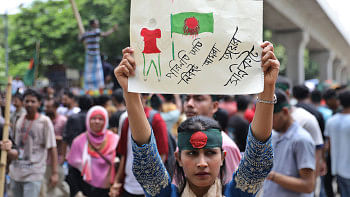Edible oil brands in a crunch

The people of Bangladesh create culinary wonders with spices and oil. The country consumes 15 lakh tonnes of edible oil a year and fulfils around 80 percent of its requirement from imports. But a common villain is now affecting Bangladesh, like others in the world -- food inflation.
To control inflation, the government has taken different steps, of which, some appear good for while some others not so effective.
Fixing the standard price for oil is one such measure, said Shoeb Md Asaduzzaman, head of sales and marketing of Bangladesh Edible Oil Ltd (BEOL).
Asaduzzaman said 25 companies, including local and multinational ones like BEOL, deal with branded oil in Bangladesh, accounting for 20 percent of the edible oil market.
A large segment of the population prefers to use loose oil. Palm oil is mainly imported from Malaysia and Indonesia, while North and South America lead the way in soybean oil.
He said companies selling branded oil are now in despair as the government fixed the price for a litre of refined soybean oil (loose) at Tk 88 a litre in Dhaka and Tk 87 in Chittagong.
The move was made on December 22 for the next 15 days, but the price is yet to be re-fixed again. It was decided that the maximum retail price of a litre of packed soybean would be Tk 100.05 in the port city and Tk 101.20 elsewhere in the country.
The price of a litre of palm oil was fixed at Tk 85 for Chittagong and Tk 86 elsewhere. But the fixed prices were mostly followed at the mill gates only, and it had no impact on the retail market, he said.
State-owned Trading Corporation of Bangladesh said a litre of loose soybean oil was sold at Tk 107, up by 9.38 percent from last month, and palm oil at Tk 97, up by 11.56 percent from last month, in markets in Dhaka on Sunday.
There was a time when the difference in prices between soybean and palm oil was around $200 to $250 a tonne. Now, a tonne of soybean oil in Chicago is priced at $1,280 FOB (free on board), while palm oil stands at $1,270 FOB.
"In July 2010, a tonne of soybean oil was $836.74 and a 5-litre branded oil pack of BEOL was Tk 434. In December, the price was fixed at Tk 510 but the international price was $1,272 a tonne. It means that the price increased by more than 45 percent in the international market, but the government allowed us to increase the price by only 15 percent in the local market."
"BEOL sells branded oils only and we have to maintain a long chain to distribute our products, which requires huge investment," Asaduzzaman said.
"Banks are also not allowing us to open letter of credits (L/C) now, as we are selling our products at a loss now. In November, L/Cs for 11,000 tonnes of oil were opened whereas the amount was 30,000 tonnes in December -- less by 1.6 lakh tonnes than the usual time."
With the number of L/Cs opened in November and December, Bangladesh could hardly maintain its local demand for 15 days. But this could have easily been avoided if the government took steps from beforehand, he said.
The government could import two lakh tonnes of oil before the start of 2011, as almost all international news agencies, including Bloomberg, made forecasts that 2011 would be a year of food inflation, he said.
"But they didn't take any steps." All this led BEOL to count losses worth Tk 18 crore in the last three months, as per audited reports by Rahman Rahman Huq, due to the government's price intervention and unhealthy competition.
"The government talks about implementing an open market economy but it is intervening in the prices of the wrong products. In Bangladesh, people mainly use loose oil. The government is failing to control loose oil prices, but it is taking tough measures for packed oil."
The government fixed the standard price by following the prices charged by local companies, rejecting the multinational ones.
Other branded oil selling companies sell around 85 to 90 percent loose oil and 10 percent of branded oil. They make up their loses in branded oil sales by selling loose oil. But BEOL is counting the highest loses as it sells branded oil only, Asaduzzaman said.
"We used to deliver our products to 1,10,000 shops in a week. To minimise losses, I had to cut the jobs of 192 salesmen, out of 550, in the last three months. Now the number of shops covered stands at 80,000." This also resulted in a cut in jobs in the supporting agencies.
"Last year, we arranged 10 carnivals. We were planning to arrange 15 such programmes this year. But because of the losses, we stopped after organising five such carnivals," he added.
"We used to advertise our products on Channel - I, NTV, ATN, Daily Prothom Alo, The Daily Star, Somokal, Naya Diganta and Amar Desh. But this year, we had to cut the frequencies of advertisements to costs.
BEOL's advertising costing is around Tk 4 a litre. The government should free the market for branded oil and control the prices of loose oil, as most people use loose oil.
"The price of branded oil will retain a shape then as no one would want to lose market share due to high prices," he added. Oil prices are higher in Bangladesh than in India.
"India is one of the biggest importers of oil in the region, for which, they enjoy a lower price in imports. India should sell oil at lower prices than us, but they are not doing so. The government is marking us a villain."
At present, the government maintains a multi layered VAT (value added tax) system for oil imports, which means that there are more authorities in action.
The government should take all the VAT at the import stage to avoid unnecessary harassment and corruption.
The official also recommended introduction of a distributorship system for loose oil, replacing the existing DO (delivery order) system. Asaduzzaman said Bangladesh Vegetable Oil Refiners' and Vanaspati Manufacturers' Association sent a letter to the commerce secretary on January 30, requesting a fixed mill gate price of a litre of soybean oil at Tk 115, following a price hike in international markets. But they did not get any reply yet.
If crude oil prices increase, the price of cooking oil will also go up. This is because in Europe and America, people are bound to use at least 5 percent bio-diesel, for which palm oil is a great source, in their total usage of fuel for vehicles.
The US economy should maintain 3 percent growth in corresponding years for the next three years to put its unemployment rate down to 1 percent from 9.8 percent at present.
As far as the US is concerned, President Barack Obama will surely try to bring economic growth, resulting in high crude oil prices, as well as cooking oil prices.
This means that if edible oil production does not go up next year, there is no chance of seeing a fall in prices of the product in the fourth quarter of this year or the first quarter of next year, Asaduzzaman added.

 For all latest news, follow The Daily Star's Google News channel.
For all latest news, follow The Daily Star's Google News channel. 



Comments